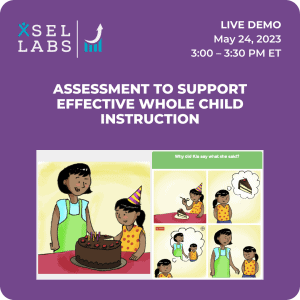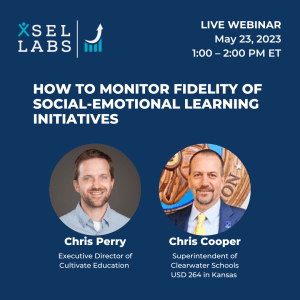Recently, the xSEL Labs team met with a group of educators in an ethnically and socioeconomically diverse school district that is using our SEL assessment to inform their SEL instruction. As is so often the case, the district team asked a terrific question that got us at xSEL Labs to think.
One question, in particular, has stayed with me.
The district had begun to use restorative practices in place of more punitive disciplinary practices. One member of the district team asked, “Does our SEL assessment measure restorative practice skills?”
Social and Emotional Learning Skills and Restorative Practice
My first response was that no SEL assessments directly measure restorative practice skills. And I stand by that answer. But, in thinking it over, there’s more to it.
Restorative practices replace punitive disciplinary practices with strategies to build community and interpersonal relationships, including strategies to repair relationships that have been damaged by interpersonal conflict.
Building interpersonal relationships and community depends heavily on community members’ social-emotional skills. After all, social-emotional skills by definition facilitate successful interpersonal interactions and the development of positive relationships. Educators who want to create successful restorative practice communities must therefore teach social-emotional skills. And, as I’ve discussed previously, assessment plays an important role in teaching SEL.
The Role of Social and Emotional Skills in Repairing Relationships
The repairing in restorative practices can be done in various ways, but typically involves bringing together those who have been harmed and those who have done harm in a forum designed to elicit restorative action on the part of the offender and forgiveness on the part of the victim.
Social-emotional skills are critical in repairing relationships.
Imagine two students who have a conflict on the playground and one child ends up hurting the other. Imagine then an adult bringing those two children together to help repair the relationship. A key to this process is that each child understands how the other feels—that skill is emotion recognition. They will benefit by understanding each other’s points of view—that is social perspective-taking. The children will have to stay calm in the face of strong feelings so they can think things through—that is self-control. They will have to work together under a shared social goal to make things better and figure out how to repair the relationship—that is social problem-solving.
I expect, then, that the better children are at emotion recognition, social perspective-taking, self-control, and social problem-solving—skills that can be assessed—the more successful they will be able to participate in the restorative process.
The Role of Restorative Practices in Teaching Social and Emotional Skills
In this same situation, the adult has a powerful real-world opportunity to teach social-emotional skills. If one of the students is having trouble knowing what the other is feeling, she can ask that student to look at the student’s face and listen to the student’s tone of voice. She can point out what the other student is doing to express anger—for example, the way the child’s eyebrows pull together. If the students are too upset to talk, the teacher can coach them on strategies to calm down so they can engage the process. And the entire exercise of identifying ways to repair the relationship is an exercise in social problem-solving.
Social and Emotional Assessment and Restorative Practices
No SEL assessment that I know of measures restorative practice skills directly. But many do measure skills that are critical to the success of restorative practices.
SELweb and other assessments measure skills that are deeply woven into the fabric of restorative practices. As a result, knowing students’ SEL strengths and needs may help adults engage students more effectively in restorative practices, and may help adults more effectively engage in restorative practice as a context for teaching social-emotional skills.
Whatever you are doing to strengthen the bonds between your students and teachers and students, SEL skills matter. Contact xSEL Labs to learn more about social-emotional learning (SEL) assessments.



